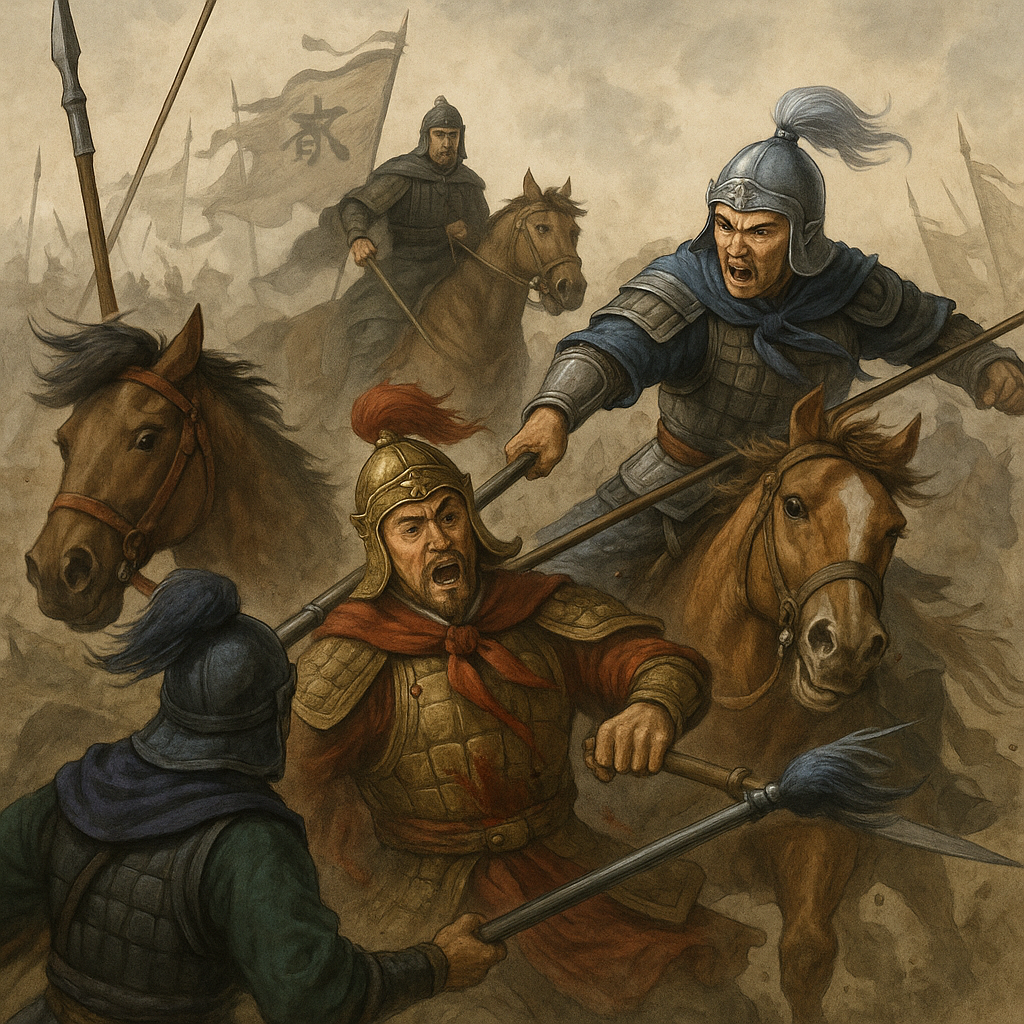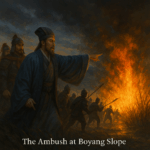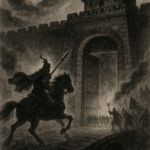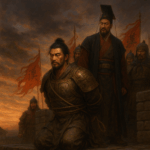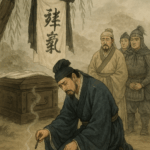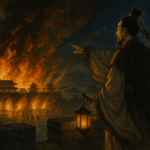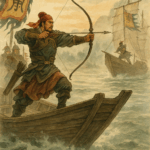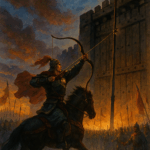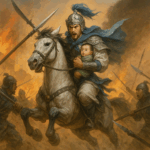After Yuan Shao’s crushing loss, Cao Cao reorganized his forces and set off in pursuit. Shao, clad simply in a linen cap and plain robes, led just eight hundred cavalry north to Liyang’s riverbank, where the general Jiang Yiqu received him. Shao recounted the tale of his defeat, and Jiang rallied the scattered remnants; hearing that Shao still lived, they flocked back like ants, restoring Shao’s strength and prompting plans to return to Ji Province.
That night they camped on a desolate hill. From Shao’s tent drifted distant sobs; curious, he slipped out alone to discover a cluster of defeated soldiers weeping at the loss of brothers and parents. Each wailed, “Had we only heeded Tian Feng’s counsel, we would not be in this ruin!” Shao was stunned with regret: “Because I did not listen to Tian Feng, I have lost the army and the state. How can I ever face him again?” At dawn, as Shao rode out, Feng Ji arrived to escort him. Shao glared, “I cannot bear to see Tian Feng!” Feng Ji slandered, “Master Feng laughed at your defeat, saying, ‘I told you so!’” Enraged, Shao drew his sword and dispatched a courier ahead with orders to execute Tian Feng in his prison.
Tian Feng lay in chains awaiting execution. When a jailer greeted him, “Congratulations, sir—your fortunes rise!” Feng bowed his head: “What is there to celebrate?” The jailer explained, “General Yuan returns broken but alive; your loyalty will now be rewarded.” Feng smiled sadly: “I am already dead.” The jailer protested, “Everyone rejoices at your deliverance—why speak of death?” Feng replied, “Yuan Shao is generous to friends but cruel to the faithful. If he had triumphed, he might have pardoned me; now, in shame, he will surely have me killed.” When the executioner’s sword arrived, everyone wept. Feng spoke calmly as he was led away: “A man born under Heaven who serves unworthy masters lacks wisdom. Today I die with a clear conscience—what have I to regret?” With those words he slit his throat. A lament soon circulated:
“Yesterday Ju Shou fell on the battlefield,
Today Tian Feng perished in his cell.
The pillars of Hebei lie shattered—
No wonder Shao’s state is lost!”
Yuan Shao returned to Ji Province in turmoil, neglecting state affairs. His wife, Lady Liu, urged him to name an heir. Shao’s three sons were spread among the provinces: the eldest, Yuan Tan (courtesy name Xian Si), governed Qingzhou; the second, Yuan Xi (Xian Yi), held Youzhou; the youngest, Yuan Shang (Xian Fu), born of Lady Liu herself and kept close at hand for his handsome bearing, won his father’s special favor. After the disaster at Guandu, Lady Liu pressed for Yuan Shang’s succession. Shao consulted his four chief advisers: Shen Pei and Feng Ji supported the youngest; Xin Ping and Guo Tu favored the eldest. Shao announced, “The realm is unsettled, and we must decide quickly: Tan is stern and quick to kill; Xi is gentle and indecisive; Shang, young though he is, shows promise—he favors respectful scholars. What say you?” Guo Tu warned, “To set aside the eldest for the youngest will breed chaos. Let us first devise how to repel Cao Cao; succession can wait.” Yuan Shao wavered.
News arrived that Yuan Xi led sixty thousand troops from Youzhou, Yuan Tan brought fifty thousand from Qingzhou, and Shao’s nephew Gao Gan marched another fifty thousand from Bingzhou. Elated, Shao refitted his army for a fresh attack on Cao Cao.
Cao Cao, meanwhile, had stationed his victorious legions beside the Yellow River. Local elders—dusty and white-haired—offered him food and wine. Cao welcomed them into his tent, asking their age; one answered, “Nearly a hundred.” Cao lamented the havoc his soldiers caused, but the elder replied, “At Emperor Huan’s reign a celestial omen foretold a savior would arise here in fifty years. Now, fifty years later, Cao Cao comes with righteous arms to punish Yuan Shao for burdening the people. His victory at Guandu fulfills that prophecy. The people await your rule.” Cao smiled, distributed gifts of silk and grain, then ordered his troops, “Whoever slays a farmer’s dog or chicken will be punished as if he slew a man.” Thereafter his army and the commonfolk alike felt his justice.
Yuan Shao drew up his three provinces’ levies at Cangting, arraying thirty thousand horsemen on flat ground. Cao Cao advanced to meet him, encamping nearby. The next day their armies faced off. Cao Cao led forth his generals; Shao displayed his three sons, nephew, and civil and military officers. Cao called out, “Shao, your plans have run dry—why not surrender before your head rests on my sword?” Furious, Shao cried, “Which of you dares charge?” Yuan Shang leapt to the front in shining armor, brandishing twin blades and galloping about the field. Cao pointed him out: “Who is that youth?” An officer named Shi Huan of Xu Huang’s command charged Yuan Shang. They dueled fifty blows without advantage, then Yuan Shang wheeled and fled; Shi Huan gave chase until Yuan Shang loosed an arrow that struck Shi Huan in the left eye, felling him dead. Shao’s heart soared, and he led his host in a savage onslaught, forcing Cao’s lines to break until nightfall.
That evening Cao Cao and his captains plotted Shao’s downfall. Cheng Yu proposed a ten-fold ambush: retreat to the riverbank, conceal ten units in hidden positions, then let Shao pursue; trapped with no escape, he would fight to the death—and die. Cao approved. He divided his troops into five corps on each flank—commanded by Xiahou Dun, Zhang Liao, Li Dian, Yue Jin, Xiahou Yuan on the left; Cao Hong, Zhang He, Xu Huang, Yu Jin, and Gao Lan on the right—with Xu Chu as vanguard in the center. At midnight Xu Chu feigned a raid, then galloped back. Yuan Shao, hearing the clamor, pressed after him. At dawn he came to the river’s edge, finding Cao’s army arrayed before him with no path of retreat. Cao Cao cried, “Raised by Heaven, we die or win as one!” and his troops charged. Xu Chu led the way, cutting down dozens of Yuan soldiers. Panic seized Shao’s host. As Shao wheeled to flee, Cao’s forces struck from both flanks: Xiahou Yuan on the left and Gao Lan on the right. Shao and his sons fled in terror, their coffers and wagons abandoned. After ten miles of chaotic retreat, Le Jin and Yu Jin intercepted and slaughtered the remnants. Shao, bloodied and desperate, collapsed from exhaustion and illness, crying, “I have fought dozens of battles and never been so routed! Heaven must be against me!” He bade his officers split to their provinces—Yuan Tan to Qingzhou, Yuan Xi to Youzhou, Gao Gan to Bingzhou—to raise fresh levies, while he and his surviving sons remained in Ji Province under Shen Pei and Feng Ji’s care.
Cao Cao, triumphant at Cangting, showered his troops with rewards and sent scouts into Ji Province. They reported that Shao lay ill on his couch, guarded by Yuan Shang, Shen Pei, and Feng Ji, while Yuan Tan, Yuan Xi, and Gao Gan had returned to their domains. Though urged to press the siege immediately, Cao Cao demurred: “Ji Province’s granaries are vast, and Shen Pei is resourceful. Let us wait for the harvest before besieging the cities.”
Just then a memorial arrived from Xun Yu:
“Liu Bei in Runan has raised tens of thousands under Liu Pi and Gong Du. On learning you marched north, he left Liu Pi to guard Runan and led troops to strike Xuchang itself. You must return at once.”
Alarmed, Cao Cao left Cao Hong to watch the riverbank and hastened south to meet Liu Bei.
Liu Bei, with Guan Yu, Zhang Fei, Zhao Yun, and others, rode to seize Xuchang. Near Mount Rang they encountered Cao’s forces and encamped in three divisions: Zhao Yun on the southeast, Zhang Fei on the southwest, and Liu Bei with Zhao Yun again at the southern gate. Cao Cao arrived, and Liu Bei rode forth under the banner. Cao rebuked him, “I welcomed you as an honored guest—why now betray that grace?” Liu Bei retorted, “You wear the minister’s robe but are a traitor. I am kin of the Han emperor, come by secret edict to punish you!” He brandished the imperial warrant. Cao, enraged, sent Xu Chu forward; Zhao Yun sallied as well. They dueled fiercely until Zhou Yu’s signal: Guan Yu and Zhang Fei crashed in from the flanks. Struck on three sides, Cao’s troops broke and fled.
The following day Liu Bei sent Zhao Yun to challenge Cao again; Cao stayed within his camp. Then Zhang Fei was sent—but Cao’s army did not respond. Cui Dong reported that Gong Du’s grain convoy was under siege. Liu Bei rushed Zhang Fei to its relief—but Zhang Fei himself was encircled. Hearing that Xiahou Dun had outflanked Runan, Liu Bei prepared to withdraw, but a final summons from Xu Chu forced him to retreat. At dawn he issued orders for a feigned retreat; as Cao’s forces pursued, they were ambushed behind an earth mound and crushed. Caught between ambush and frontal attack, Yuan forces were routed, and Liu Bei rode off with only a thousand followers.
By midday, Taoist villagers welcomed the weary band, offering goats and wine. Liu Bei, reflecting on the loyalty of his brothers and generals, feared for their safety and urged them to find a strong lord. Zhao Yun reminded him of Han Gaozu and Xiang Yu’s rivalry: “A hero need not win every battle—perseverance wins the realm.” Sun Qian suggested Jingzhou under Liu Biao, whose resources were plentiful and who shared Han lineage. Liu Bei sent Sun Qian at night to plead his case. Liu Biao received him thirty li outside Jingzhou and, despite Cai Mao’s slander, embraced Liu Bei as a brother. Liu Bei, Guan Yu, Zhang Fei, and Zhao Yun were all warmly welcomed into Jingzhou.
Meanwhile, Cao Cao prepared to march on Jingzhou. Cheng Yu counseled caution: “Yuan Shao still lives north of the Yellow River. First let us garrison Xuchang, build our strength, and then in spring march first against Yuan Shao, then into Jingzhou—thus seizing both north and south.” Cao agreed and turned his army back to Xuchang.
In the first month of Jian’an’s seventh year, preparations began anew. Cao dispatched Xiahou Dun and Man Chong to guard Runan against Liu Biao, and left Cao Ren and Xun Yu at Xuchang, while he himself marched north again in camps around Guandu. Yuan Shao, convalescing from his wounds, was urged to seize Xuchang. Shen Pei begged him to fortify deeply and restore his army’s morale, but upon hearing Cao’s advance Shao resolved to lead his troops out personally. Yuan Shang offered to go in his stead, and Shao at once summoned Yuan Tan from Qingzhou, Yuan Xi from Youzhou, and Gao Gan from Bingzhou. Four armies would unite to oppose Cao Cao—another contest upon the horizon:
“The battle drums of Runan still resound,
From northern Ji Province new rallies sound.”
What fate awaits them now? The answer lies in the chapters to come.
